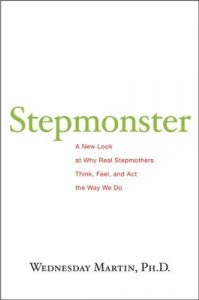|
|
September 7, 2009
 Stepmonster by Wednesday Martin When you think about stepmothers, what comes to mind? For me it’s that heartless woman whose idea of a family outing was to take Hansel and Gretel into the woods and abandon them…twice. Then there’s the callous, opportunistic bitch who fleeced Cinderella’s dad for all he was worth then treated her stepdaughter like a slave in her own home. And let’s not forget that ultimate charmer, so narcissistic and jealous of Snow White she order a hit on the girl. “Cut out her heart and bring it to me in this box!”
Geez! With stepmoms like that it’s no wonder we grow up with such fear and loathing for women who marry men with children. But with 43% of first marriages ending in divorce and so many subsequent remarriages, the likelihood of a child having a real stepmother is relatively high.
So what’s really inside the hearts and minds of stepmoms? Are they as powerful and conniving as we’ve been led to believe? And if so, then why are they blamed for so much that goes wrong in their families? And why are they given so little credit for their sincere efforts to be a positive force in the lives of their husbands and stepchildren? Fair questions that deserve answers.
In this week’s podcast I talk with Wednesday Martin, author of Stepmonster: A New Look At Why Stepmothers Think, Feel And Act The Way We Do. We get into the fact vs. the fantasy of real stepmoms from someone who has walked the walk and done her homework inside and outside of the family. Every woman who married a man with children or is considering it, needs to hear this one! Men who brought a stepmom into the lives of their kids, don’t want to miss it either.
Have a listen here:
[QUICKTIME http://www.anniefox.com/podcast/FC008.m4a 300 300 false true]
If you have iTunes, you can subscribe to this podcast in the iTunes Store.
Or, you can download an MP3 version here.
Resources suggested by Wednesday Martin:
Upcoming guests include:
Ayelet Waldman, author of Bad Mother: A Chronicle of Maternal Crimes, Minor Calamities, And Occasional Moments of Grace
Diane Peters Mayer, author of Overcoming School Anxiety
Izzy Rose, author of The Package Deal: My (not-so) Glamorous Transition from Single Gal to Instant Mom
Diane E. Levin, co-author (with Jean Kilbourne) of So Sexy So Soon: The New Sexualized Childhood And What Parents Can Do to Protect Their Kids
Susan M. Heim, author of It’s Twins! and Chicken Soup for the Soul Twins and More
Rachel Simmons, author of The Curse of the Good Girl: Raising Authentic Girls with Courage and Confidence
Hannah Friedman, author of Everything Sucks: Losing My Mind and Finding Myself in a High School Quest for Cool
*What’s a podcast? “A podcast is a series of digital media files, usually either digital audio or video, that is made available for download via web syndication.” –Wikipedia… So, in this case, there’s an audio file for you to listen to (in addition to reading the above).

September 1, 2009

So connected and yet not
Good ol’ Mr. Rogers knew what he was singing about when he was putting on his sneakers: “I mean I might just make mistakes if I should have to hurry up and so I like to take my time.” When he was home, I’m sure his kids got at least the same level of attention as he gave his shoe laces. To his credit, that guy could really focus on one thing at a time.
Recently I’m becoming more aware of how cranky, stressed and distracted I get when I try to do a whole lot of stuff at once. So I’m trying to slow down and zero in. But it ain’t easy. Admittedly, as I’m writing this I’m also picking remnants of chewed almonds from in between my teeth, answering email, tweeting, and squinting at this sentence as I wonder how long it will take for the eyeglasses I left in our hotel room in Elko, NV to make their way back here. (Soon please!)
Tweens and teens constantly email me for advice. They say their parents “don’t listen.” Parents tell me the same thing about teens. We’d all like to improve parent-teen communication but we can’t do our part when we’re busy with six other things or even one other thing. (Same goes for improving communication between you and your honey-pie.)
Obviously you can’t always drop everything to listen to your child. But let’s be honest: not many of us do open-heart surgery or negotiate international crises at home. So when our kids want to talk, need to talk, we could take a break and focus on them if we choose to. But most of the time we keep doing whatever we’re doing and shift into an unconscious auto-listening thing (“Uh, huh. Uh, huh”).
Here’s why that’s a bad idea.
- It’s disrespectful. In a healthy relationship trust and respect have to flow in both directions. Want your kids to respect you? Then you’ve got to respect them. Auto-listening is rude.
- It’s not fooling them. Even toddlers have been known to turn Mom’s or Dad’s head to get their attention. If an 18 month old knows that no eye contact means you’re preoccupied, how can you hope to fake it with a teen? And why would you want to?
- You’re showing them that “other things” are more important to you than they are. You don’t really feel that way so why send that message? Your teens probably don’t get 100% attention from their teachers or their friends. Let them at least get it from you while you’re having a conversation.
- Auto-listening is poor modeling. Our kids don’t listen to us for a couple of reasons: a) they’re teens and they need to at least pretend to shut us out so they can build their own identity and b) we haven’t spent enough time showing them what active listening looks and feels like. You can’t do much about their developmental need to shut you out, but making a real effort to listen (with eye contact, 100% of your attention, and an open heart and mind) teaches them to listen more attentively to you and others.
WARNING! Don’t assume an increase in real listening will eradicate all disharmony between you and your teen. (We’re working on communication here, not miracles.) But if you focus more on listening you can reasonably predict there’ll be less confusion about what was actually said in a conversation. That means less arguments studded with gems like: “I never said that!” “You never said that!” and “What are you talking about?!”
That’d be cool, right? Hello? Anyone there?

August 18, 2009
 Sometimes we all need a new perspective Face it, the people we live with (and love and cherish more than life itself) can push our buttons like nobody’s business. (That expression never made much sense to me but I’ve always liked the sound of it.) This button-pushing fest can be especially competitive between parents and teens. They give us “that” look,“that” attitude, etc. etc. and we just lose it. And you don’t need me to tell you that we parents do and say things that irritate the crap out of our teens.
But who’s the adult here, right? It’s bad enough to blow up (or melt down) with our own flesh and blood, but when I think about what my “moments” taught my kids about self-control, conscious choice-making, and treating others with respect, well, I want to turn myself in to the bad parent police. OK, so no parent is perfect. And we all have gone off the deep end from time to time. We need to forgive ourselves in the same way that we forgive our kids when they act… crazy.
A new school year is about to burst forth with all kinds of never-before-seen challenges to our parenting chops. If you haven’t reached human perfection yet, you might want to try this simple process. It can help you be more of the parent you want to be more of the time. (i.e., especially when someone in your family is being soooooooo annoying!)
When a family member does or says something that grates on your nerves, ask yourself:
1. What’s going on with me right now? Irritation? Embarrassment? Frustration? Boredom? Resentment? Jealousy? Identifying what you’re feeling is the first step to understanding yourself and your reactions and taking those reactions off automatic pilot.
2.Why is this bothering me so much? We just may be least tolerant of those whose behavior reflect traits that we least like in ourselves. That’s something worth thinking about when a family member starts to drive you crazy.
3. What’s my usual way of responding? What are the usual consequences of my response? How do those help/aggravate the situation? Thinking clearly about your usual reactions can encourage you to explore other options. Especially if what you normally do just makes things worse.
4. What does this person need? That’s not often asked when people push your buttons, but if you can ask it and consider the possible answers, negative family dynamics may start to shift. For example, does this person (my son/daughter/partner) just need someone to listen to them and acknowledge their feelings? Sounds like what most of us want and need at different times. So the problem may not be what the person wants, but rather their inability to ask for it directly. If you can figure out what they want and you can provide some or all of it, you might find a) their “irritating” behaviors become less frequent, b) you feel more compassion and love towards them, and c) you feel good about having freed yourself from an unhelpful automatic response. Win-win.
Begin today. Talk honestly with your teens about the challenges all people have expressing our needs and responding to family members in conscious and compassionate ways. Share with them what you’ve learned about being part of a family. (The positive legacy and the not so.) Remind them that families are forever, but family dynamics are not carved in stone. Just because two people have always interacted in a certain way doesn’t mean they can’t change. With compassion and a willingness to be honest about your feelings and your needs, you teach your children that healthy adults can continue growing in positive directions. Bottom line, just like our teens, we parents are also works in progress.

August 16, 2009
 ''Schuyler's Monster: A Father’s Journey with His Wordless Daughter'' by Robert Rummel-Hudson All living things, with the exception of clones and genetically engineered corn and soybeans, are unique. Of course that includes children. Every kid has a collection of traits, quirks, interests, annoying habits, talents and abilities that makes him or her truly special. That’s why education should be “special” for every child. Unfortunately it’s not. Far from it.
In spite of the “Everyone turn to page 57 in your math book” approach to learning that is so 20th century and still going strong, typical children will muddle through their K-12 years and come out the other end having succeeded to one degree or another.
But for the millions of “special needs kids” who are entitled by law to receive truly special education, many are being grossly short-changed. Why? Crippling state budget cuts aside, the crux of the problem is sometimes in the approach of educators who prejudge a child’s ultimate learning potential and design programs based on what a special needs student “can’t” do rather than acknowledging what he or she may not be able to do “yet.” Education is about opening doors. No one can map out the limits of any child’s potential. That boundary line has been drawn yet.
All kids need parents to advocate for them. Special needs kids need especially loud and pushy parents to go to bat for them at school and help them get what they require to succeed.
In this week’s podcast I talk with Robert Rummel-Hudson author of Schuyler’s Monster: A Father’s Journey With His Wordless Daughter. We talk candidly about his daughter Schuyler, born with a rare neurological disorder that makes language acquisition extremely difficult. We discuss the challenges of connecting with a special needs child and the obstacles parents often encounter when dealing with schools. We also talk about what every parent of a special needs child needs to know in order to be your child’s most ferocious and unyielding advocate.
Have a listen here:
[QUICKTIME http://www.anniefox.com/podcast/FC007.m4a 300 300 false true]
If you have iTunes, you can subscribe to this podcast in the iTunes Store.
Or, you can download an MP3 version here.
Upcoming guests include:
Wednesday Martin, author of Stepmonster: A New Look At Why Stepmothers Think, Feel And Act The Way We Do
Ayelet Waldman, author of Bad Mother: A Chronicle of Maternal Crimes, Minor Calamities, And Occasional Moments of Grace
Izzy Rose, author of The Package Deal: My (not-so) Glamorous Transition from Single Gal to Instant Mom
Diane E. Levin, co-author (with Jean Kilbourne) of So Sexy So Soon: The New Sexualized Childhood And What Parents Can Do to Protect Their Kids
Rachel Simmons, author of The Curse of the Good Girl: Raising Authentic Girls with Courage and Confidence
Special thanks to our friend and musician/composer Curt Siffert who let us use his song, “Broken Frost” for the opening of this podcast.
*What’s a podcast? “A podcast is a series of digital media files, usually either digital audio or video, that is made available for download via web syndication.” – Wikipedia… So, in this case, there’s an audio file for you to listen to (in addition to reading the above).
 — Older Posts »
| |















